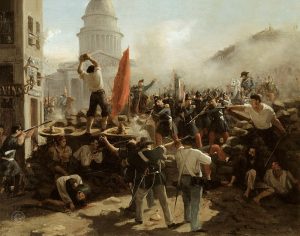Political Restoration and Reform in Europe
Political Restoration and Reform in Europe It is hard to believe today, but until recently, European democracies tolerated serious corruption scandals and mismanagement of public offices. Leaders and parties involved in these practices were routinely reelected.
But the Congress System’s balance of power was beginning to unravel. In its place was a new kind of rivalry centered on nationalism.
The Congress System
After Napoleon’s defeat, the major European powers met at the Congress of Vienna to restore monarchies that Napoleon had overthrown and establish a system of cooperation, or what became known as the “Congress System.” Under the leadership of Klemens von Metternich of Austria and Lord Castlereagh of Great Britain, the goal was to preserve peace by meeting regularly, or in short, the Concert of Europe. The idea was to keep the main powers’ military and economic resources in balance so that one could not dominate or threaten the other.
Despite the concerted efforts of the established and reactionary powers to suppress them, disruptive ideas of liberalism, radicalism, socialism and nationalism began to gain popularity. These movements demanded constitutions, universal manhood suffrage, freedom of the press and free speech, the abolition of tariff barriers and the rationalization of legal systems. They also favored the creation of democratic republics and the limitation of prince power through constitutional monarchies.
The resentment that these movements generated coalesced into the new political ideology of nationalism by the early nineteenth century. Poles resented the conservative Austrian and Russian states that divided up Poland, Germans resented their neighbors in Italy and Prussia, and Greeks saw themselves as autonomous peoples artificially ruled by foreign powers.
As nationalist sentiment grew, the Concert of Europe began to weaken. Even though the major Powers remained in general cooperation, they sought to strengthen their own military strength and occupy more territory overseas.
The Decembrist Uprisings
In 1848, the new political ideologies that had been brewing since the Napoleonic Wars finally coalesced. Coalitions of artisans, students, and educated liberals rose up across Europe and succeeded in running their monarchs out of their capital cities (as in France) or forcing them to agree to constitutions and rationalized legal systems (as in Prussia, Austria, the smaller German kingdoms, and Italy).

The most dramatic example of this upheaval was the Decembrist Revolt in Russia. On December 26, 1825, a group of army officers led by General Mikhail Miloradovich gathered 3,000 troops on Senate Square to refuse the oath of loyalty to the new Tsar, Nicholas I, because their heir-presumptive, Constantine, had declined the succession. Eventually, the Emperor’s loyalists opened fire, killing many of the rebels and sending the rest to Siberia. The rebels were branded “treasonous rabble”, and many of them, including Miloradovich, were stripped of their noble titles and sent to prison or Siberia for hard labor. Many of the wives and daughters accompanied their husbands into exile, and they became known as “dekabristki.”
The Russian state’s reaction to this rebellion was to bolster its authority by developing the doctrine of Official Nationalism, which reframed the idea of nationalism as a form of patriotism that guaranteed the Tsar’s central role. This doctrine would remain in place until the Revolution of 1917.
The Balkan Uprisings
The 19th century saw state formation in the Balkans after the region’s Christian populations induced foreign intervention to separate themselves from Ottoman power. The process did not affect the territorial ambitions of the two dominant Great Powers—Russian aspirations focused on Constantinople and the Dardanelles, while Austria-Hungary’s were centered on securing Salonika. But World War I destroyed the imperial structures that had defined the regional balance of power and imposed a new order. The territorial boundaries were radically altered, and Bulgaria, Serbia-Montenegro, Montenegro, Albania, Croatia, Carniola, Vojvodina, Slovenia, Bukovina, and the Banat of Temesvar were incorporated into the Kingdom of Serbs, Croats, and Slovenes, later Yugoslavia.
The region still suffers from the consequences of those events. Bad governance, sluggish economies, and European ambivalence have stalled the EU integration process. The Dayton peace agreement that held Bosnia and Herzegovina together is unravelling, while the Bosnian Serb entity, Republika Srpska, is pursuing a slow-motion breakaway attempt by severing its ties to the joint armed forces, border police, and judiciary system while demanding far greater autonomy.
However, the reshaping of the Balkan landscape also left room for the revival of nationalist sentiments. Bulgaria and Greece consolidated their independence by annexing districts of the former Ottoman Thrace and Macedonia, while Serbia and Montenegro used the dissolution of the Habsburg Empire to assert claims on parts of the old Austrian Empire. The overlapping territorial ambitions of the Balkan states created tensions that would resurface in subsequent generations, not least with Turkey’s brutal treatment of ethnic Kurdish protesters after the 1980 coup.
The Revolutions of 1848
The revolutions of 1848 impacted Continental Europe in a way that few events before or since had. They helped give rise to a variety of new political movements, such as the Socialists and Communists. They also sparked an intellectual debate that continues to the present day.
The revolutionary movement was driven by a variety of factors, including the ideas that had flooded European societies in the last quarter of the eighteenth century with notions of fraternity and equality. While these ideas impacted all classes, the working class was the backbone of the revolutionary movement. Those in the middle classes shared a desire for reform, but had different views on specific goals.
Those in the lower classes were dissatisfied with reforms that did not address these two core issues. They also feared the loss of their economic status. The agrarian economy was being replaced by industrial capitalism. Land that had once been used for food production was now being used for railroad and factory construction. This created a growing competition for jobs, driving wages down. As a result, laborers started turning to socialist and communist movements to organize themselves. They saw the revolutions of 1848 as a potential vehicle for their own needs.



